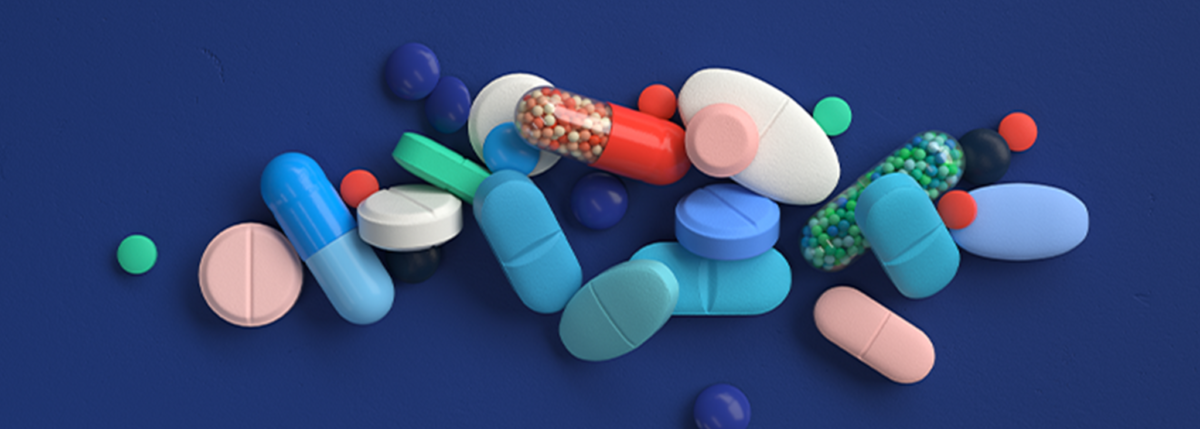How Medications Can Impact Type 1 Diabetes Management
Editor’s Note: This content has been verified by Marina Basina, MD, a clinical associate professor at Stanford University. She’s a clinical endocrinologist and researcher with a focus on diabetes management and diabetes technology. Dr. Basina is an active member of multiple medical advisory boards and community diabetes organizations, and she is on the Beyond Type 1 Science Advisory Committee.
When taking medicine, you must always read labeling carefully and be aware of possible side effects. When you have type 1, you have the added consideration of how it will affect your blood glucose levels as well as any devices that you depend on for your diabetes management. And as with anything you digest, you must know the carb count, administering insulin as needed. Apart from daily medication such as birth control, having a sick-day protocol is always smart for the unexpected bug. This way, you’ll be stocked ahead of time with essentials to ease your mind and decrease additional stress over your care. Here are some must-knows about over-the-counter medication and what it means for your type 1.
Cold Medicine
Being sick stresses the body, and when your body’s stressed it releases blood-glucose raising hormones. These hormones can even prevent insulin from properly lowering your blood glucose levels. Consider the following when taking cold medicine:
- Opt for pill forms—if possible, pills over syrups are better for their lack of carbohydrates.
- Check for added sugars—When taking syrups, double-check the labels of over-the-counter brands to make sure they don’t have added sugar.
- See if there’s a sugar-free option—Though small doses of sugar don’t pose a huge risk, your safest bet is to ask your pharmacist about sugar-free syrups.
- Check your blood glucose levels (BGLs) frequently—This should be triple the time you typically check. Being sick makes you more susceptible to BGL extremes.
- Administer insulin accordingly – Medicine, just like food, must be dosed for.
Blood Glucose Levels
Even without sugar, short-term cold medicines can send your blood glucose levels spinning.
- Aspirin has been known to lower glucose levels in children or at very high levels
- Pseudoepinephrine, the decongestant found in most over-the-counter products, can raise blood glucose levels
- Steroids, (like prednisone), are hormones that decrease the effectiveness of insulin by prompting the liver to dump more glucose into the blood stream, cause elevated blood sugar levels
The key is when you’re ill to be body mindful and test, test and test again. Doctors advise following more stringent sick-day rules such as:
- Testing for ketones
- Checking blood glucose more often
- Getting at least eight ounces of fluid per hour as dehydration can drive up blood glucose levels as well.
Misreadings on CGM
And don’t blindly trust your continuous glucose monitor (CGM) readings, as acetaminophen (Tylenol) and other over-the-counter pain medicines and fever reducers are known to interfere with certain devices. Instead, rely on testing with your blood glucose monitor while under the weather.
Preparing Ahead
But brains, just like bodies, devolve into sore, sluggish, aggravated messes when ill, and who can be expected to remember all the dos and don’ts of medicating in the middle of a raging war with a head cold or worse? Get proactive and prepared now, while healthy. It beats the alternative of grabbing the nearest bottle of cough syrup and plunging yourself into more misery.
Make an illness plan ahead of time with your doctor that includes:
- Lists of recommended medicines that treat different common cold and flu symptoms and are both type 1 and celiac safe
- Doctor contact information and where and when they can be reached during the week, evenings, weekends and on holidays
- A plan for how often you should check your blood glucose levels (BGLs) (every four hours), how much you should drink (at least eight ounces of water every hour), and how much you should eat (15 grams of carbohydrates every hour if your blood glucose levels are running low)
- Adjust insulin doses as needed but do not stop insulin.
- Stock up on these hydrating and energy-providing items:
- Diet and clear sodas without caffeine
- Clear broths
- Sugar-free popsicles
- Regular gelatin
- Glucose gel (fast-acting to treat lows)
- Low-calorie sports drinks (for fast-acting sugars and electrolytes)
- Cereals (like oatmeal)
Test for ketones if your BGL reaches 240 gm/dL. If any show, call your doctor. Also be sure to call our doctor if your temperature reaches 103.
Carb Counting with Medicine
Don’t forget that many medicines contain carbohydrates and your body is used to strict carbohydrate-consumption guidelines that affect how much insulin you need to administer and when.
It can be hard to find nutritional content for over-the-counter and prescriptions medications. Ask your doctor or your pharmacist. If they don’t have the information you’re looking for, consider turning to the internet. Several online databases maintained by type 1 patients now exist. Ketomeds.com, for instance, lists the carbohydrate content of hundreds of medications.
Modify your dietary carb intake accordingly when taking medications.
Birth Control
While birth control pills, patches, implants, injections and rings are generally considered to be safe forms of contraception for women with diabetes, the high dose of estrogen in birth control pills can raise blood glucose levels. Many doctors recommend taking a pill with the lowest possible estrogen level. Other doctors suggest women with diabetes avoid hormonal birth control altogether. The American Diabetes Association recommends combination birth control pills, containing synthetic estrogen and norgestimate.
Just like with cold medicines, birth control pills contain a multitude of ingredients. Ask your doctor or pharmacist to verify your prescription is gluten-free.
Lastly, if you’ve been recently diagnosed with celiac disease or are in the early stages of living gluten-free, some doctors advise using back up barrier forms of birth control in addition to oral contraceptives until you know for sure that your body is not suffering from absorption problems.
Type 1 and Celiac Disease
It’s estimated that those who are type 1 are eight to ten times more likely to suffer from celiac disease (gluten-intolerance).
In fact, doctors now recommend screening for celiac or type 1 diabetes in people already diagnosed with either of the two conditions. Both are genetic disorders that share similar genes. Both are immune-regulated and associated with autoimmune conditions like thyroiditis and rheumatoid arthritis.
Those with type 1 and undiagnosed celiac disease often experience unstable blood glucose levels, decreased insulin requirements, weight loss and a loss of bone density. Even after getting diagnosed and starting a gluten-free lifestyle, symptoms may take up to a year to improve as the gastrointestinal tract heals and begins to properly absorb food and nutrients.
While having celiac disease alongside type 1 doesn’t have to significantly alter or dictate your quality of life, there are a few things to have on your radar when living with both conditions, particularly around the issue of medications.
What about cold medications and celiac disease specifically?
Generally most major physician-formulated brands work hard to keep their cold medicines free of gluten. But any time you take a pill, whether in tablet or capsule form, a risk exists of an ingredient containing gluten. This is because medicines are composed of several ingredients known as excipients, and they include the active medicinal component, and inactive ingredients such as absorbents that take on water and allow the tablet to disintegrate, binders, coloring agents, lubricators and bulking agents that help some medicines dissolve more slowly as they travel throughout the intestinal tract. Starch is a common excipient. And while corn remains the most common type of starch, starches derived from potato, tapioca and wheat (gluten alert!) are also used.
Gluten-free Meds—
- Common analgesic pain and fever reducers like Tylenol, Advil, Aleve and Motrin
- antihistamines, decongestants and cough/cold medicines such as Allegra, Sudafed, Dayquil and Robitussin liquid gels and caplets
Glutenfreedrugs.com is an excellent, pharmacist-maintained resource that tracks celiac-safe medications, including both prescriptions and over-the-counter remedies. But be on the lookout for gluten reactions even when taking “safe” medicines, as manufacturer facilities may not be dedicated gluten-free, posing a small contamination risk.
Further reading: Cold and Flu and What to Do





